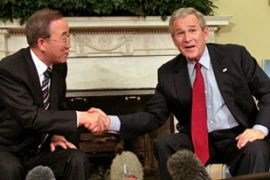Ban: Bush seeking UN help in Iraq
Secretary-general tells Bush UN operations in Iraq hampered by “security concerns”.
The International Compact for Iraq is a five-year plan to ensure that the Iraqi government has funds to survive and enact important political and economic reforms.
|
|
“Bush’s strategy has failed totally in Iraq”
Dimos, Hania-Crete, Greece
Send us your views
|
Kofi Annan, the former UN secretary general, withdrew the UN’s international staff from Iraq in 2003 following two attacks on UN offices in Baghdad and a series of attacks on humanitarian workers.
Sergio Vieira de Mello, a UN envoy in Iraq, was killed in one of the attacks along with 21 others.
UN staff began returning to Iraq in August 2004 and played key roles in helping to draft a new Iraqi constitution and prepare for elections, but numbers of UN staff members on the ground remain limited.
Ban said that in his talks with Bush he emphasised the importance of “a strong partnership” between the US and the UN and that he “very much encouraged” Bush’s pledge of continued US support and participation “in all areas of UN activities”.
Ban also said he “strongly appealed” to the US Congress to lift its 25 per cent cap on US contributions to UN peacekeeping operations.
Since 1995, the US Congress has capped Washington’s contribution to the UN Department of Peacekeeping Operations (DPKO) budget at 25 per cent of the total budget, while the UN assesses the US contribution at around 27 per cent.
|
“I told President Bush that … the UN presence and operations in Iraq is actually constrained by the situation on the ground”
Ban Ki-moon,
UN Secretary-General
|
Although Washington is the largest contributor to the UN, the cap creates an annual shortfall of two per cent in US contributions.
Ban said: “There’s a shortage of two percent which will result in annual $150-200m shortage [in] American contributions, which will if accumulated create very difficult constraints.”
US relations with the UN reached a low point in 2003 when the Security Council refused to authorise the US invasion of Iraq.
John Bolton, the US ambassador to the UN who resigned from the post unable to win confirmation of his position from the US Senate, was particularly critical of the UN and its reform efforts.
Ban is expected to undertake a large restructuring of the UN’s peacekeeping operations, which currently sees almost 100,000 “blue helmets” serving in 18 missions around the world.
